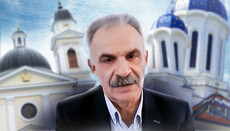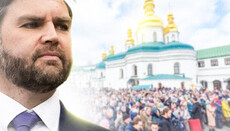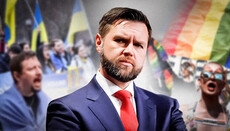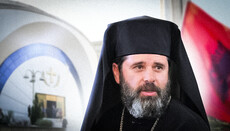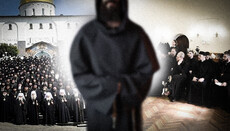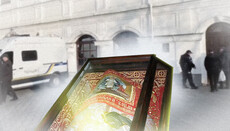UOC-OCU mix in a joint Synod or resolving the “Ukrainian issue” Greekishly
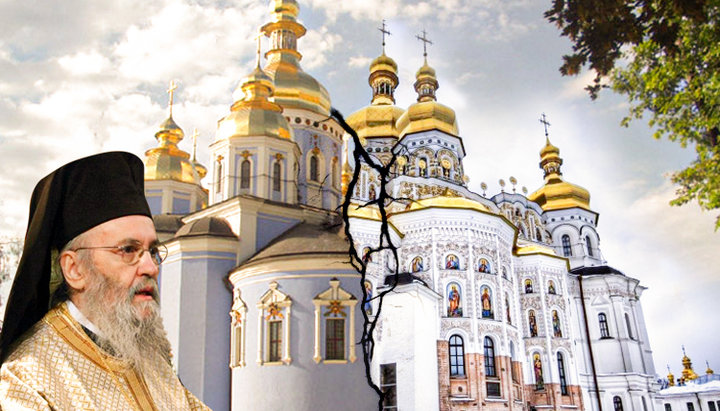
Hierarch of the Greek Church Hierotheos (Vlachos) published his proposals on how to break the impasse that arose in Orthodoxy after the creation of the OCU by Phanar.
Recently, among representatives of the Patriarchate of Constantinople itself, as well as among those who sympathize with it, there are more and more people who understand that it was a mistake to grant the Tomos to the OCU. At the same time, they either can’t admit it openly or don’t want to, therefore they are looking for ways to retreat. In the language of diplomacy, they are trying to “save their face”. This can explain the appearance of articles and publications which try to prove the "apostolic succession" of schismatic "ordinations" or those which justify the actions of Patriarch Bartholomew in Ukraine.
One of such publications is an article by Metropolitan Hierotheos (Vlachos) published on the Romfea website. In this work, he comes up with his proposals both for holding a Pan-Orthodox Council and for resolving the situation in Ukraine. The analysis of this article is brought to your attention below.
Metropolitan of the Church of Greece Hierotheos (Vlachos), whom Orthodox Christians in Ukraine know from the books about Jesus Prayer, Hierarch Gregory Palamas and the theology of the twelfth holidays, is a staunch supporter of the theory of primacy of the Patriarchate of Constantinople regarding the contemporary church situation.
His Eminence developed his own concept of the Orthodox understanding of conciliarity which, in his opinion, differs from Catholic and Protestant.
For example, among Catholics, according to Metropolitan Hierotheos, the conciliarity principle is completely absent being replaced by the primacy of papal infallibility and sole control of the church.
The Protestants have no conciliarity, because it is replaced by individualism and extreme subjectivity. In other words, if Catholics have one pope, then with Protestants each is a pope to himself.
As for the Orthodox Church, here Metropolitan Hierotheos proposed, as he thinks, a certain “middle way”. According to his concept, a visible symbol of the unity of the Church should be the Patriarch of Constantinople, who, at the same time, individually administers the Church, taking into account a conciliar opinion of all the Local Orthodox Churches.
That is why for Hierotheos (Vlachos), the decisions of Phanar are not subject to challenge or protest, but are taken as correct a priori.
On schismatic “ordinations”
In his publication, Vladyka Hierotheos says that only the “ordinations” of the UAOC (including inter alia Makariy Maletich) raise doubts with the representatives of the Greek Church. He writes, “The Autocephalous Church of Ukraine consisted of the schismatic Filaret’s group, which was anathematized, and the schismatic group of Makariy. The priesthood and apostolic succession of this latter group is questionable.”
However, if this is so, then why did Phanar accept Ukrainian autocephalists into communion? Just for the reason that the quantity will crush the missing quality? It turns out that there were many representatives of the UOC-KP, whose “consecration” raised questions, and there were fewer representatives of the UAOC, and they were all admitted, so to speak, in a bulk mixing “doubtful” and “non-doubtful” to get a certain general mixture. But Phanar forgot that if they mix a conditional jar of honey with that of waste products of human life, they will not receive two jars of honey at all, but two jars of waste products instead. Therefore, even if for a second we take the point of view of the Patriarchate of Constantinople about the canonicity of the “consecration” of the UOC-KP, then having mixed them with the “doubtful consecration” of the UAOC, Phanar received two doubtful outputs.
In addition, Vladyka for some reason frugally kept silent about the anathema imposed by the Russian Orthodox Church on Filaret (and, therefore, on the entire “hierarchy” ordained by him), which was recognized both by the Patriarchate of Constantinople and other Local Orthodox Churches.
Tomos as a weapon against the Moscow Patriarchate
Metropolitan Hierotheos is confident that “the Ecumenical Patriarchate granted autocephaly after he had assessed the situation in Ukraine, and especially after he’d fully realized the tactics of the Moscow Patriarchate to the detriment of the Ecumenical Yhrone. I believe that the Ecumenical Patriarchate will not abolish it.”
This passage is simply terrifying by the power of its cynicism and unwillingness to see the obvious. The situation in Ukraine on the eve of the granting of the Tomos was assessed by two people, the so-called “exarchs” of the Patriarchate of Constantinople, as well as by Archbishop Job (Getcha).
All of them not only clearly sympathized with the schismatics, but they themselves came from among Ukrainian autocephalists (Daniel Zelinsky was originally a Uniate) who emigrated to the United States or Canada. The question is: how could these people objectively and impartially assess the situation in Ukraine? In addition, this “assessment” was carried out exclusively unilaterally – none of the representatives of Phanar had ever (!!!) met with His Beatitude Metropolitan Onuphry nor with the UOC Chancellor, Metropolitan Anthony, or other officials of our Church.
The Phanariots granted the Tomos because "they fully realized the tactics of the Moscow Patriarchate to the detriment of the Ecumenical Throne". The struggle for power and influence in the Orthodox world is the main reason for this.
They met exclusively with representatives of Ukrainian schismatic groups and with representatives of the authorities, who were extremely hostile to the UOC. If this is called objectivity on the part of Phanar, then what does bias mean to them? How could such a serious decision be made without communicating with the Church, which for decades has been called (and continues to be called) the only canonical Church of Ukraine?
The answer to this question is given by Metropolitan Hierotheos in the second part of this passage –the Phanariots issued the Tomos because "they fully realized the tactics of the Moscow Patriarchate to the detriment of the Ecumenical Throne". The struggle for power and influence in the Orthodox world is the main reason for this.
Opting-out of the Russian Orthodox Church from the Cretan Council was regarded as "tactics to the detriment of the Ecumenical Throne". Thus, the granting of the Tomos is not an attempt to “heal the schism”, but an attempt to consolidate its position in order to continue to appeal to “customary law,” according to which, in Phanar’s opinion, autocephaly is granted exclusively by Constantinople. By the way, at one time, having almost completely lost its influence in Europe, Catholic theologians developed the theory that only the Pope can crown (crown) a king. This privilege was supposed to at least somehow demonstrate the power possessed by the “Christ’s vicarius”. Later, this demonstration grew into the dogma of infallibility. Something similar can be observed today in relation to the Patriarchate of Constantinople.
Pan-Orthodox Council as it is interpreted by Metropolitan Hierotheos
The hierarch writes that "it is necessary to make a decision on how autocephaly is granted within the framework of the conciliar and hierarchical tradition of the Orthodox Church in order to prevent the occurrence of constant tensions and schisms in the Orthodox Church caused by this problem."
He also believes that “at the moment the goal must be to resume the discussion on the granting of autocephaly not only in relation to the Church of Ukraine, but also in relation to other church provinces of other Patriarchates in order to prevent new tension and the emergence of new schisms. Obviously, this should be decided by the Pan-Orthodox Council or the Assembly of Primates of the Orthodox Churches.”
Therefore, even researchers close to Phanar understand that the problem can only be solved with the help of the Pan-Orthodox Council, and this should be done as soon as possible so that, according to Bishop Hierotheos, "this schismatic situation does not become permanent, because, as the Greeks say, ‘long-term problems are difficult to cure’.”
“If rapprochement of opinions on a specific proposal to be made by the Local Churches, in particular, the Ecumenical Patriarchate and the Moscow Church, does not take place beforehand, then there is no reason to hold an Orthodox Council.”
The solution he proposes is to convene a Pan-Orthodox Council or an Assembly of Primates of the Orthodox Churches. However, in his opinion, "if rapprochement of opinions on a specific proposal to be made by the Local Churches, in particular, the Ecumenical Patriarchate and the Moscow Church, does not take place beforehand, then there is no reason to hold an Orthodox Council."
This means, he says further, that it is necessary to prepare such a proposal that would suit both the Russian Orthodox Church and the Patriarchate of Constantinople. Naturally, in this case, the only proposal of this kind, which the ROC will unconditionally accept, is that Phanar should revoke the Tomos for the OCU. However, Phanar is unlikely to go that far.
Given this, Metropolitan Hierotheos proposes to organize a meeting. But this meeting will be possible only if the Russian Church agrees to withdraw its decision to break off the Eucharistic communion with the Patriarchate of Constantinople, "and as a sign of goodwill, the Moscow Patriarch should begin to honor the Ecumenical Patriarch in diptychs."
It turns out that it is the Moscow Patriarch, whose canonical territory was brutally invaded by Patriarch Bartholomew, who should show his goodwill and break the ice in the obvious conflict of the two Churches. Thid act, of course, is Christian. But, after all, Patriarch Bartholomew is also a Christian. Why, then, should he not show “goodwill” and revoke his Tomos? It would be a great example of a truly evangelic approach to solving this problem. But, mind you, Phanar does not even consider such a possibility.
Further, as a basis for the upcoming discussions at a probable Pan-Orthodox Council, Vladyka Hierotheos proposes to take two texts that were prepared for presentation at the Cretan Council. He says, inter alia, that Phanar has all the current problems with Ukraine are caused by the fact that the Russian Orthodox Church had a different opinion about who and how should sign the Tomos on autocephaly. But it just makes me ask a question – how about that notorious principle of conciliarity if any Local Church cannot have an opinion that differs from the opinion of Phanar?
However, from the point of view of Metropolitan Hierotheos, there is nothing to discuss here, because the decision on the issue of granting autocephaly should be prepared by the commission, while the Pan-Orthodox Council will only ratify it "without losing sight of the canonical and traditional privileges of the Ecumenical Throne". So, hoping for a dialogue or discussion (as he said above) is not necessary – everything will be decided before the Council, which will simply become a formality.
According to Vlachos, the Pan-Orthodox Council should ... approve the decision of the Ecumenical Patriarchate to grant autocephaly to the Church of Ukraine so that there is the consent of fifteen Churches.” Do you understand? The Council “should” do everything as Phanar wants, i.e. recognize the OCU.
In order to understand how the Phanariots and their supporters view a probable Pan-Orthodox Council, it is enough to read the following passage of Metropolitan Hierotheos: “this Pan-Orthodox Council must declare that today there are fourteen Churches; to affirm the patriarchal dignity and honor of some later patriarchates so that the unresolved situation can be resolved; approve the decision of the Ecumenical Patriarchate to grant autocephaly to the Church of Ukraine, so that there is the consent of fifteen Churches.” Do you understand? The Council “should” do everything as Phanar wants, i.e. recognize the OCU. No more and no less.
Proposals of Metropolitan Hierotheos on Ukraine
The main idea of the Greek hierarch is to organize a temporary “church regime” in Ukraine. In his opinion, this "regime" should suit representatives of all "church jurisdictions that exist in Ukraine and fall under this Autocephalous Church".
To this end, he proposes the introduction of a “system of episcopal assemblies that prevails in the Diaspora, the canonical functioning of which was approved by a vote at the Cretan Council in 2016. The rules for using this system already exist and can be adapted in accordance with the requirements of the Autocephalous Church of Ukraine.”
To put it simply, the Greek hierarch proposes combining both schismatics and canonical bishops in one Synod. At the same time, everyone there will make a liturgical mention of their patriarch (Kirill or Bartholomew).
This “Permanent Holy Synod” should consist of “twelve bishops, the head of the Holy Synod being the thirteenth”. The synod itself should include an equal number of members from existing church jurisdictions (UOC, OCU and UOC-KP) and all hierarchs of the Autocephalous Orthodox Church of Ukraine will participate in a single Bishops' Council.
And then he produces just a wonderful phrase: "for the first time when the bishops meet, they can either elect the Primate of the Orthodox Church in Ukraine or decide who it will be." In order for this system to be commenced as soon as possible, Metropolitan Hierotheos advises to involve the civil power and political actors of Ukraine.
The crux of Metropolitan Hierotheos’ theory
The main conclusion from the foregoing is that Metropolitan Hierotheos (Vlachos) completely does not understand what is happening in Ukraine. He, in fact, offers a new version of the “Unification Council”, which was organized by Phanar back in December 2018, proposing to link together what cannot be linked – the Church and the schismatics. Nothing came of it at the “unification council”, since out of the total number of the canonical hierarchy only two bishops wished to unite with the breakaway groups. Why does Metropolitan Hierotheos think that everything will work out now?
After all, the fact that the schismatics were called by Phanar not schismatics did not change anything in the Ukrainian church situation. For all the Local Churches of the world, the schismatics remained schismatics. And first of all, this is true for the Ukrainian Orthodox Church – neither Epiphany nor Filaret will be able to enter into communion with Her hierarchy without repentance. There can be no joint synod or bishops' council with these individuals just because we have no doubt about their “consecrations”.
Besides, can you fancy a joint meeting of such a “synod” simultaneously with raider seizures of Orthodox temples? We cannot, but Phanar can. Because they think that there will be no seizures. But they are inevitable because, as it was mentioned above, each metropolitan will commemorate "his own patriarch". This means that our opponents will not calm down because for them the struggle against liturgical mention of the name of Patriarch Kirill is a struggle for their own patriotic identity. Therefore, what will change if the proposal of Metropolitan Hierotheos is translated into reality? Nothing at all.
Well, attracting state power as the main argument for better functioning (if any functioning) has also been the case in the recent history of Ukraine. From all the previous activities of the former president Petro Poroshenko, it was utterly clear that with the help of politicians it would not be possible to unite Orthodox Christians and schismatics of Ukraine. There are more effective, and most importantly, tried and true methods in the church tradition, among which repentance takes the first place.
Conclusions
If at the moment Phanar is looking for an avenue to resolve the "Ukrainian issue", then we, for our part, can offer it.
- The Patriarchate of Constantinople revokes the Tomos for the OCU.
- Representatives of the Ukrainian schism bring public repentance and only after that enter into communion with the Ukrainian Orthodox Church.
- Those of them, who were not banned in the canonical Churches and also do not have canonical obstacles for consecration, are re-ordained by the Church.
- At the Pan-Orthodox Council, the Ukrainian Orthodox Church is introduced into the diptychs of all the Local Orthodox Churches.
- At the Pan-Orthodox Council, the Patriarch brings public repentance for serving with schismatics.
This is, in fact, the only possible way. It’s highly improbable Phanar will accept it. In this case, only one thing remains – the convocation of a Pan-Orthodox Council and the announcement of Patriarch Bartholomew as being outside the Church. Of course, for many in the Orthodox World and, above all, for the Greek hierarchs, such a scenario would seem almost offensive, but only this scenario corresponds to the spirit of the Gospel and the position of patristic teachings of the Church. An alternative to it is a split of Orthodoxy.
